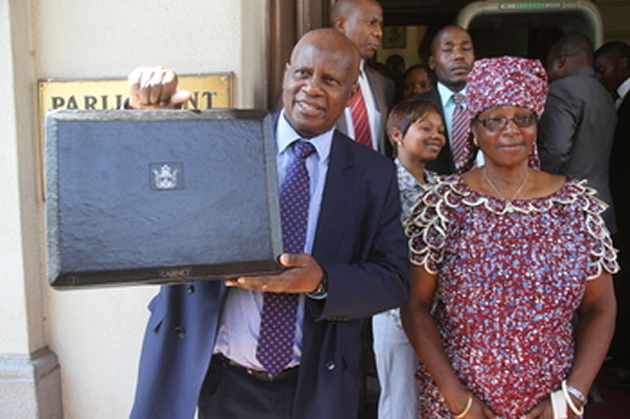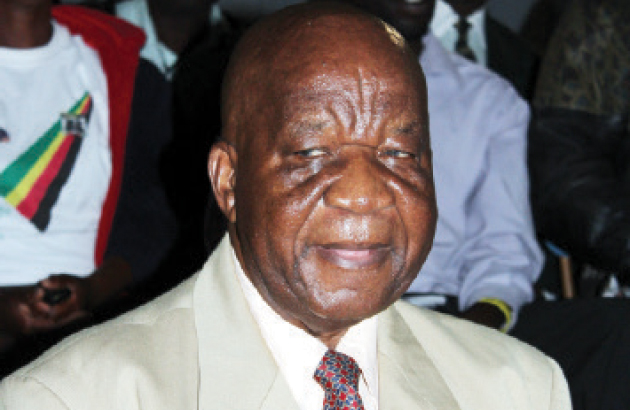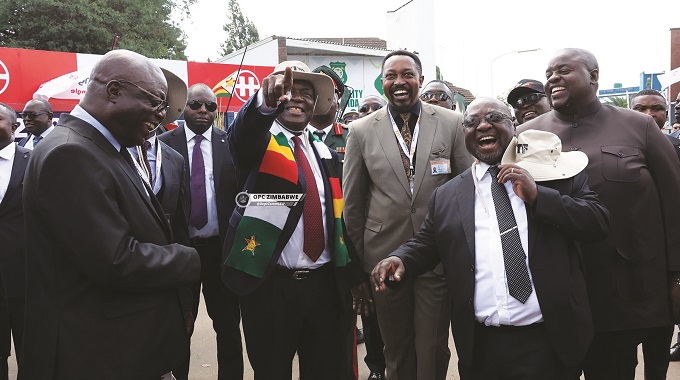$4.1bn budget unveiled

 Business Reporters
Business Reporters
FINANCE and Economic Development Minister Patrick Chinamasa yesterday announced a $4,1 billion 2015 national budget packed with policy interventions aimed at unlocking the economy’s productive potential, supported by domestic and external resources.
About 80 percent of the budget — $3,32 billion — will go towards meeting employment costs, leaving just $798 million for operations, debt service and capital expenditure.
Workers earning less than $300 will be exempted from paying income tax with effect from January 1 next year. The tax-free threshold was last reviewed in 2012.
The minister maintained the recent 20 percent duty hike on vehicle imports and the five percent tax on airtime vouchers and called for efficiency in tax administration and information sharing.
Excise duty on cigarettes was increased from $15 to $20 per 1,000 sticks while tobacco levy was re-introduced on tobacco growers.
But a five percent excise duty reduction on beer will bring cheer to drinkers, with Delta Beverages poised to slash prices.
“I propose a budget of $4.1 billion for fiscal year 2015, consistent with our macro-economic forecasts for the year. This budget is around the same level as that for the previous fiscal year, reflecting continued constrained fiscal space as in 2014,” said Chinamasa.
As part of measures to boost domestic industrial growth the minister proposed a raft of incentives for exports to stimulate growth and development of the economy underpinned by improving production and export of goods and services through value addition and beneficiation.
“We have put in place export incentive schemes which include duty drawback, inward processing rebate and reduced tax for companies that export more than 50 percent of manufactured output,” he said.
“In order to assist exporters to secure markets, I propose to exempt foreign agents’ fees from withholding tax.”
Chinamasa also proposed a 12-month duty relief on capital goods imported by tourism operators to facilitate expansion and modernisation programmes such as refurbishment of hotels and conference facilities. To enhance fast clearance of cargo, movement of travellers and also enhance revenue collection, Chinamasa proposed to introduce an Electronic Single Window Facility which entails coordination and cooperation among all agencies involved in regulatory requirements at the ports of entry.
He said this will reduce the cost of doing business and enhance border post’s efficiency and monitoring of illegal entry points through proliferation of agents at different ports of entry.
Chinamasa also proposed to increase the period for goods in transit from 10 to 30 days.
Increased support to small and medium enterprises, value addition and beneficiation and scrapping of royalties for rough diamonds form part of the revenue measures announced by the minister to stimulate growth.
“The major challenge is that the revenue base remains limited, and hence, the need to expand it. It is critical that we focus on implementing the Zimbabwe Agenda for Sustainable Socio-economic Transformation (Zim-Asset) strategies and policies meant to grow the economy, and create wealth to develop the country,” said Chinamasa.
He said the economy needs substantial investment both domestic and foreign direct investment, as well as other support for infrastructure development.
He announced a review of the country’s indigenisation policy, with indigenisation compliance now the responsibility of line ministries who will negotiate with investors on their compliance plans.
While the 51/49 percent ownership structure would still apply across all sectors, it would be on the basis of the assessment by the line ministry responsible for the sector that the compliance certificate in respect of the investment proposal would be issued by the ministry responsible for indigenisation and economic empowerment.
Chinamasa said a timeous and consistent implementation of agreed policy interventions will require a collective commitment.
He said the country was set to receive development assistance estimated at $468.2 million and loans of about $552.03 million in support of the 2015 fiscal policy.
“Of the indicative $468.2million, bilateral partners have pledged $248.8 million and multilateral partners $219.1 million.
“Of the total expected development assistance pledges, about $62.1 million will be channelled towards infrastructure development projects, leaving about $406.1 million for various programmes under food security, social services, Small and Medium Enterprises support and other cross-cutting issues,” said the minister.
He said about $557.04 million was anticipated in the form of loans and joint venture arrangements.
“These resources will be channelled towards various Zim-Asset infrastructure development projects, necessary for supporting our productive sectors.”
Chinamasa said work on the implementation of Special Economic Zones was at an advanced level, saying the government’s desire was to have a “hybrid approach” in which several models have been submitted to Cabinet for approval.
“These include single factory, product-specific, industrial parks, knowledge-based service, and multi-sectoral wide area models, among others.
“These models will take into account the country’s special socio-economic situation, sources of comparative advantage and practical considerations,” he said.
He said sectoral preparedness and potential should facilitate fast tracking implementation of Special Economic Zones, for example around textiles, information communication technology, tourism and mineral beneficiation, among others.
The goals of the Special Economic Zones will be achieved through a strategy that takes into account historical circumstances such as de-industrialisation, lack of capital for infrastructure and liquidity, abundant natural resources, including our mineral resources.
Chinamasa said once these processes were complete he will table the Special Economic Zones Bill for the consideration of Parliament by mid-2015.
2015 Budget Highlights
l $4,1 billion budget unveiled
l Employment costs to chew up 82% of budget
l Excise duty on beer cut by 5 percent
l Taxable income threshold raised from $250 to $300
l Economy to grow 3,2 percent in 2015, inflation below one percent.
l $253m for Presidential Inputs Scheme to support agriculture
l $200 million boost for struggling firms
l Tax on unprocessed platinum suspended
l Manufacturing sector to grow 1,7 percent in 2015
l Debt to close at $8,3 billion by December 2014
l New indigenisation guidelines announced
l Minimum capital requirements for insurance firms reviewed upwards
l FDI to register 69 percent growth










Comments